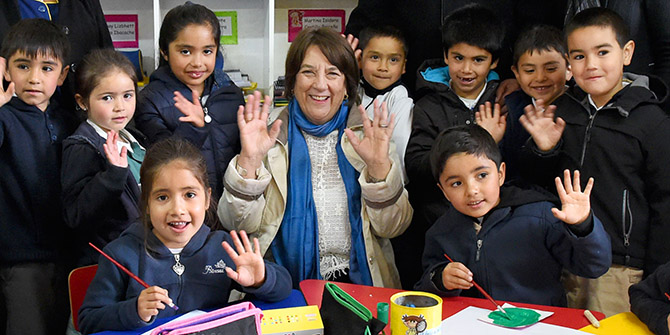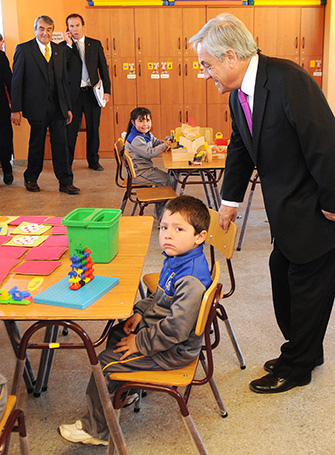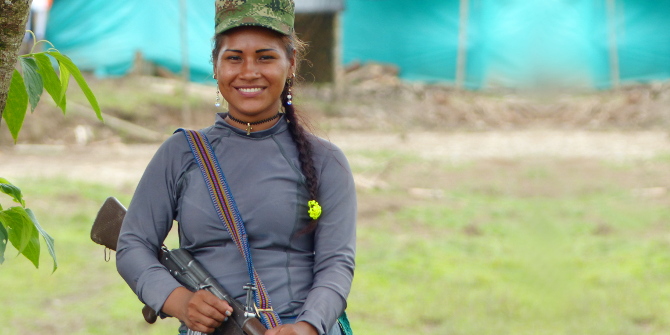
 If Chile wants to advance towards a society that gives all children equal opportunities to develop, the government should look to evidence-based educational policies that respect international human-rights law, write María Isidora Palma (LSE Social Policy) and Vicente Silva (Human Rights Centre, Essex University).
If Chile wants to advance towards a society that gives all children equal opportunities to develop, the government should look to evidence-based educational policies that respect international human-rights law, write María Isidora Palma (LSE Social Policy) and Vicente Silva (Human Rights Centre, Essex University).
In May 2015, the Chilean government passed the Inclusion Law, which sought to regulate school admissions, end arbitrary selection, and eliminate the “shared funding” system through which families were obliged to pay fees to schools already receiving state subsidies. The law aimed to allow parents to choose and access educational institutions regardless of their economic capacity and to prevent publicly funded schools from profit-seeking.

This represented a step forward in the recognition of education as a human right, as was recognised by the UN Special Rapporteur on the right to education, who called it “a significant step in the reform process in that it ensures everyone’s entitlement to have access to public education without discrimination or exclusion.”
However, despite the successful results of the Inclusion Law’s implementation, the current government led by Sebastian Piñera has presented a draft law that would introduce further changes to public school admissions, arguing that the effort and merit behind academic outcomes require greater recognition. The proposed changes include allowing early-specialisation and high-attainment schools to use their own admission mechanisms to evaluate academic merit, with 30 per cent of places reserved for students with strong academic performance.
Debate on the proposal has centred on parents’ right to choose their children’s education and on whether or not selection mechanisms are an appropriate way of recognising merit. Defenders of the proposal argue that “merit exists, [and] to recognise it is to cultivate talent, [whereas] not recognising it rewards laziness”. But there are numerous issues with this view in terms of equality of opportunity, freedom of choice, empirical evidence on educational outcomes, and even human rights.
Educational selection in contexts of inequality
First of all, when making links between merit, effort, and academic outcomes, Chile’s high levels of inequality cannot be ignored.
If Chile were Finland, where virtually all 15-year-old students have similarly high attainment, selecting at that age would be less problematic. But Chile’s combination of selectivity and numerous other market-based educational policies have made the school system the most segregated in the OECD, with academic performance strongly linked to socioeconomic status. Selecting students in seventh grade based on their academic performance ignores the educational disadvantages faced by vulnerable children.
Education systems organised on this “meritocratic” basis rely on understandings of “talent”, “ability”, and “motivation” that are highly subjective, yet the same understandings define how opportunities are distributed.
Selectivity also has a number of well-documented side effects. Student selection incentivises the skimming-off of high-achieving or easy-to-educate rich students at the expense of disadvantaged and low-performing ones. Since less capable students require more resources to achieve the same results, selection becomes a method of maximising gains and artificially improving academic results. This has damaging effects in terms of inequality and entrenches biases against disadvantaged students.

Indeed, these findings have already been put to the test in Chile. Subsidised schools responded to competitive market pressures by selecting better students rather than by raising their productivity. Selection also led to “stratification by parental income, increased transmission of income inequality, and reduced student effort”.
Ability-screening effects are also significant for subsequent academic outcomes, with the reported performance gap between public and voucher schools mainly explained by selection in the latter rather than by a superior educational offering.
More broadly, segregated schooling undermines the civic function of education as a means of introducing students to the complexities of social life and to interactions with people from different backgrounds. Vulnerable students attending segregated schools tend to have higher dropout rates, lower levels of academic achievement, worse educational environments, a weaker civic commitment, and a higher prevalence of risky behaviours linked to poor scholastic performance.
Education from a human rights perspective
A further objection to the proposed modifications to the Inclusion Law is that they violate children’s human rights. The right to education is enshrined in article 13 and 14 of the International Covenant of Economic, Social, and Cultural Rights (ICESCR) as well as articles 28 and 29 of the Convention on the Rights of the Child (CRC), both of which count Chile amongst their signatories.
The right to education states that all people must have access to education, with special consideration for disadvantaged groups. ICESCR requires signatory states to guarantee that this right “will be exercised without discrimination of any kind as to race, colour, sex, language, religion, political or other opinion, national or social origin, property [socio-economic status], birth, or other status”. Notably, this is also an immediate obligation rather one of progressive realisation.
International Human Rights Law (IHRL) also states that the right to equality and non-discrimination requires compliance with the Aristotelian principle of “treating likes alike”, thereby prohibiting direct discrimination through provision of less favourable treatment to one of two individuals in a similar situation due to prohibited grounds.
Accounting for the fact that equal treatment in a context of pre-existing imbalances can lead to unequal results, IHRL has broadly recognised the prohibition of indirect discrimination. That is:
“…where an apparently neutral provision would put persons at a particular disadvantage compared with others, unless that provision is objectively justified by a legitimate aim and the means of achieving that aim are appropriate and necessary.”
From this perspective, a bill allowing schools to screen and select students by academic performance, even if it applies equally across the board, clearly produces significant disadvantages for children who lack the social, cultural, and economic capital to reach the required levels, unlike the children of the better-off. Not only does selection fail to alleviate existing inequalities in Chilean education and society, rather it exacerbates them and produces first- and second-class pupils. “Accidents of birth” such as class, race, or household composition become relevant to admissions decisions, where in theory schools should be blind to them.
The finding that selection is in breach of human-rights standards is not new. The UN High Commissioner for Human Rights, the UN Committee on Economic, Social, and Cultural Rights, and the UN Committee on the Rights of the Child (2011, 2014, and 2015 respectively) all suggest that it is the duty of the Chilean state to enact a human rights based approach to education policies, to end segregation in schools, to ensure equality and non-discrimination in terms of access, and therefore to eliminate selection.
Since the proposed changes to the Inclusion Law will increase segregation, they also constitute a breach of human-rights obligations. If Chile wants to advance towards a society that gives all children equal opportunities to develop, the government should look to evidence-based educational policies that respect the international human-rights treaties to which Chile has subscribed.
Notes:
• The views expressed here are of the authors and do not reflect the position of the Centre or of the LSE
• Please read our Comments Policy before commenting




